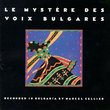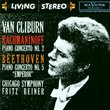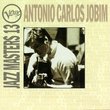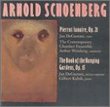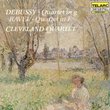| All Artists: Franz [Vienna] Schubert, Richard [Classical] Wagner, Georg Solti, Vienna Philharmonic Orchestra Title: Schubert: Symphony No 9; Wagner / Solti, Vienna Philharmonic Orchestra Members Wishing: 0 Total Copies: 0 Label: Decca Release Date: 9/14/1999 Genre: Classical Style: Symphonies Number of Discs: 1 SwapaCD Credits: 1 UPC: 028946031124 |
Search - Franz [Vienna] Schubert, Richard [Classical] Wagner, Georg Solti :: Schubert: Symphony No 9; Wagner / Solti, Vienna Philharmonic Orchestra
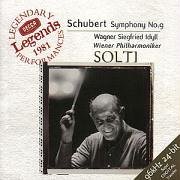 | Franz [Vienna] Schubert, Richard [Classical] Wagner, Georg Solti Schubert: Symphony No 9; Wagner / Solti, Vienna Philharmonic Orchestra Genre: Classical
|
Larger Image |
CD DetailsSimilarly Requested CDs |
CD ReviewsOne of Solti's most relaxed recordings ... Ed Brickell | 10/20/2000 (5 out of 5 stars) "... which isn't to say this superb version of one of mankind's greatest creative achievements isn't lacking in drama, or sharpness of attack. To quote Solti's comments from the booklet notes on the music, Schubert's Ninth should sound like "precision and gentleness achieved simultaneously." Passage after gorgeous passage rolls crisply but freely along like a mountain stream; and the famous Vienna band play their hearts out.Stravinsky once quipped about a hard-driven Solti performance of a Mozart opera: "Mozart is poorer than that." But Solti, whose energetic interpretations can sound inappropriately rocket-fueled at times, is obviously in love with Schubert's Ninth and gives it the time and space it needs to breathe. And breathe it does. If you're looking for a modern instrument version of this great work that you can live with for a long time, this is a true classic. Warmly recorded by Decca's master sound mages. As a substantial bonus, it comes with a dreamy version of Wagner's "Siegfried Idyll."The price is right; the performance is timeless. Go for it!" A masterpiece masterfully performed! Mike Powers | Woolwich, ME USA | 08/01/2000 (5 out of 5 stars) "For me, it began slowly - a solo French horn playing a hauntingly beautiful, stately melody. This tune was repeated softly by the orchestra, with variations. It was then gradually assimilated by another slower, sweeter melody. Finally, the orchestra burst forth with joyful exuberance into the first movement's main theme, a dance-like allegro. For another 53 minutes and three additional movements, I sat enraptured as I listened to a wellspring of gorgeous melodies and musical themes pour forth from my stereo. In this manner was I first introduced to Franz Schubert's greatest orchestral masterpiece - his Symphony No. 9 in C major, nicknamed the "Great" Symphony.Schubert's Ninth Symphony, which lasts nearly one hour, is a masterpiece of gigantic proportions. The composer wrote it near the end of his short life (he was only 30 when he died.) The symphony was discovered by fellow composer Robert Schumann several years after Schubert's death. Schumann immediately recognized the composition for what it was: the singular masterwork of a pure genius.The Vienna Philharmonic Orchestra (VPO), under the direction of the late Sir Georg Solti, offers a magnificent performance of this great work. Solti had a reputation for demanding crisp precision and fast tempi from the orchestras he conducted. The VPO and Solti do not disappoint with Schubert's Ninth. Tempi are uniformly faster than the other versions of this work that I've heard. The effect is to give the overall performance a warm, sunny disposition, even in the slower movements.This performance of Schubert's "Great" Symphony has few, if any peers, from the standpoint of warmth, passion, and vitality. It is one of my personal favorites. This magnificent recording should not be missed by any classical music lover; I heartily recommend it as an essential addition to every classical music CD collection!" A no brainer dcreader | Washington DC area | 06/08/2000 (5 out of 5 stars) "This is one of great Schubert recordings of all time, by most counts. The Penguin Guide and Gramaphone agrees that it is a first choice among Schubert's Ninth recordings. Newly remastered and at midprice makes it a simple decision."
|

 Track Listings (5) - Disc #1
Track Listings (5) - Disc #1